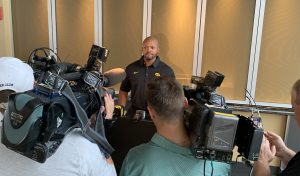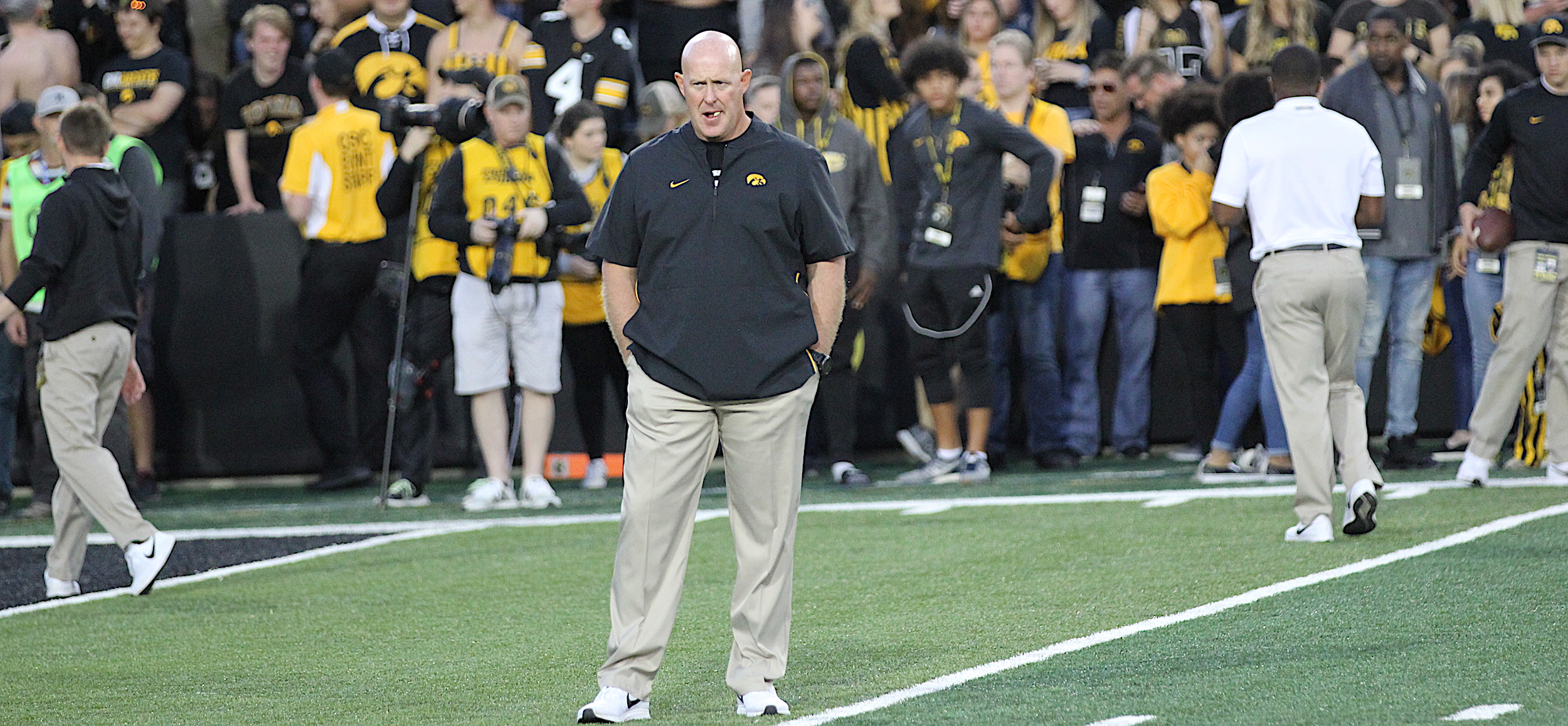Iowa’s problems on offense go far beyond loss of Chris Doyle
By Pat Harty
IOWA CITY, Iowa – As the Iowa football team’s offense continues to perform at a shockingly low level, the reasons for why it’s happening seem obvious in some cases, and not so obvious in others.
The inability to sustain a consistent ground attack, a lack of productivity at wide receiver and poor quarterback play are three obvious reasons, while the loss of former strength and conditioning coach Chris Doyle would fall under the category of not so obvious, if you even believe it.
The Doyle effect, based on recent feedback, seems to be gaining momentum as a reason the offense has plummeted to record depths from a statistical standpoint, but there is also some statistics that might suggest otherwise.
Doyle was removed from Kirk Ferentz’s staff in June 2020, and barely two weeks after multiple former players had accused the program of racial discrimination and bullying.

Many of the complaints were directed at Doyle, and Iowa apparently felt that getting rid of him was the best way to move forward.
Doyle had been with Kirk Ferentz since the beginning in 1999, and he was probably the second most powerful and influential member on the staff behind Kirk Ferentz.
Doyle was widely regarded as one of the best in his field, and he certainly had the trust, respect and admiration of Kirk Ferentz.
Some will say that Doyle was a scapegoat, and that he was let go to save offensive coordinator Brian Ferentz, who also was accused of discrimination.
While it would be hard to prove the scapegoat theory with any certainty, this belief that Iowa hasn’t been the same from a strength and physicality standpoint since Doyle was let go just doesn’t add up.
It has been suggested that the Iowa offensive line is now much softer and not as physical without having Doyle as the strength and conditioning coach.
But again, the statistics would suggest otherwise.
Some fans, based on recent feedback, seem to believe that the Iowa offensive line owned the trenches with Doyle on the staff, but that was hardly the case.
For example, Iowa, despite having three future NFL starters on the offensive line in Tristan Wirfs, Alaric Jackson and Tyler Linderbaum, only averaged 137.6 rushing yards per game in the 2019 season, which was Doyle’s last season with the Hawkeyes.
The two seasons prior to that in 2017 and 2018, Iowa averaged 139.2 and 148.4 rushing yards per game, respectively.
Those totals are mediocre at best.
The offense as a whole has certainly gotten worse without Doyle, but the reasons go far beyond the influence of one person, except for maybe Kirk Ferentz since it’s his offense.
From 2004 to 2019 with Doyle on the staff, Iowa finished 10th or lower in the Big Ten in rushing eight times.
Iowa finished 11-2 and won the Orange Bowl in the 2009 season despite only averaging 114.2 rushing yards per game.
The current Iowa team, despite being held to just 11 rushing yards in last Saturday’s 12-10 loss to Minnesota, still is averaging 115.87 rushing yards per game.
The problems on offense are more systematic and deeply rooted in the long-standing beliefs of Kirk Ferentz.

The performance of the offensive line has left much to be desired since the start of the 2022 season, but so has the performance at wide receiver and quarterback.
To blame all of that on the loss of Doyle seems misguided, and probably isn’t fair to Raimond Braithwaite, who replaced Doyle as the strength and conditioning coach.
Braithwaite worked under Doyle for Iowa from 2002-04 and from 2008 to 2020.
It’s reasonable to believe that much of what Braithwaite now teaches from a training and lifting standpoint is the same as what Doyle taught and emphasized.
Junior center Logan Jones holds the Iowa all-time squat record at 700 pounds, and he can also bench press 425 pounds and hang-clean 470 pounds.
Sophomore right tackle Gennings Dunker has recorded a 680-pound squat and reportedly has 15 bench press reps at 345 pounds.
He is also the back-to-back champion of the hay bale toss at Solon Beef Days.
The Iowa offensive line doesn’t have the individual star power of some previous offensive lines, but the numbers really aren’t that different.
The Iowa defense also has performed well without Doyle on the staff, and the unit still plays with the same toughness and physicality that it played with under Doyle.
Iowa has a deep and talented defensive line, but that wouldn’t be the case if the strength and conditioning program were lacking.
Iowa has gone from having a terrific tandem at linebacker in Jack Campbell and Seth Benson in the previous three seasons to having another in Jay Higgins and graduate transfer Nick Jackson this season.
That wouldn’t have happened without a respectable strength and conditioning program.
This isn’t to dismiss what Chris Doyle meant to Hawkeye football.
His impact was huge, considering what Iowa accomplished with him part of the mix.
He help to rebuild the program, and then helped to sustain it.
The strength and conditioning coach spends more time around the players than any other member of the staff, and with that comes much power and influence.
But it still seems a reach to say that the problems on offense are due to a lack of strength and physicality caused by the loss of Chris Doyle.
Iowa’s problems on offense are due to a number of things, from a lack of imagination to a lack of talent at certain positions, and to an unwillingness to make changes.
Injuries also have been a factor, but the offense struggled before the injuries started to mount.
With this being a bye week, Iowa (6-2, 3-2) will have had an extra week to prepare for its next game against Northwestern on Nov. 4 at Wrigley Field in Chicago.
That will give the players more time to heal and to regroup, but it probably won’t be enough time to fix the offense.
That appears to be a long-term project, with or without Chris Doyle.



